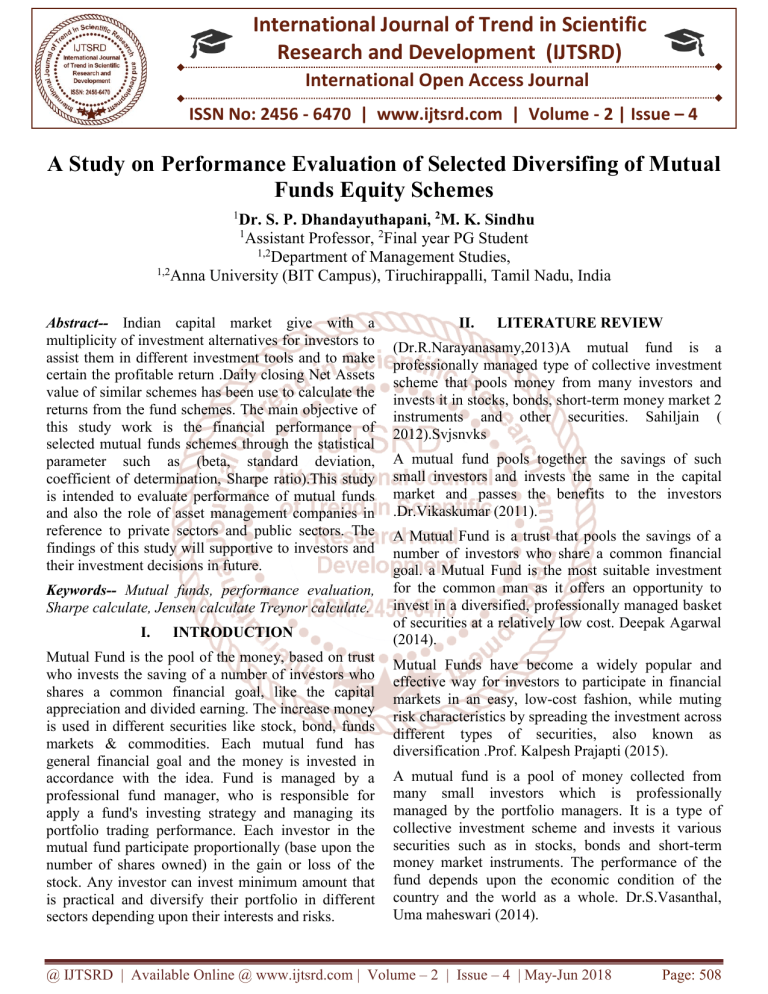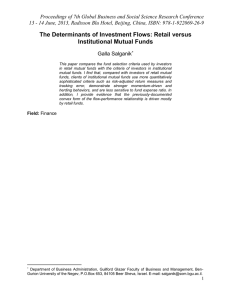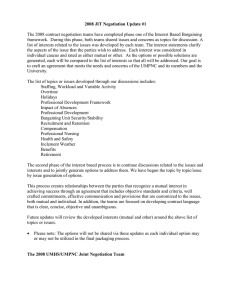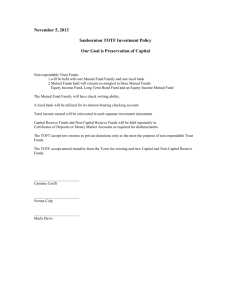
International Journal of Trend in Scientific
Research and Development (IJTSRD)
International Open Access Journal
ISSN No: 2456 - 6470 | www.ijtsrd.com | Volume - 2 | Issue – 4
A Study on Performance Evaluation of Selected Diversifing of Mutual
Funds Equity Schemes
1
Dr. S. P. Dhandayuthapani, 2M. K. Sindhu
1
Assistant Professor, 2Final year PG Student
1,2
Department of Management Studies,
1,2
Anna University (BIT Campus), Tiruchirappalli, Tamil Nadu, India
Abstract-- Indian capital market give with a
multiplicity of investment alternatives for investors to
assist them in different investment tools and to make
certain the profitable return .Daily closing Net Assets
value of similar schemes has been use to calculate the
returns from the fund schemes. The main objective of
this study work is the financial performance of
selected mutual funds schemes through the statistical
parameter such as (beta, standard deviation,
coefficient of determination, Sharpe ratio).This study
is intended to evaluate performance of mutual funds
and also the role of asset management companies in
reference to private sectors and public sectors. The
findings of this study will supportive to investors and
their investment decisions in future.
Keywords-- Mutual funds, performance evaluation,
Sharpe calculate, Jensen calculate Treynor calculate.
I.
INTRODUCTION
Mutual Fund is the pool of the money, based on trust
who invests the saving of a number of investors who
shares a common financial goal, like the capital
appreciation and divided earning. The increase money
is used in different securities like stock, bond, funds
markets & commodities. Each mutual fund has
general financial goal and the money is invested in
accordance with the idea. Fund is managed by a
professional fund manager, who is responsible for
apply a fund's investing strategy and managing its
portfolio trading performance. Each investor in the
mutual fund participate proportionally (base upon the
number of shares owned) in the gain or loss of the
stock. Any investor can invest minimum amount that
is practical and diversify their portfolio in different
sectors depending upon their interests and risks.
II.
LITERATURE REVIEW
(Dr.R.Narayanasamy,2013)A mutual fund is a
professionally managed type of collective investment
scheme that pools money from many investors and
invests it in stocks, bonds, short-term money market 2
instruments and other securities. Sahiljain (
2012).Svjsnvks
A mutual fund pools together the savings of such
small investors and invests the same in the capital
market and passes the benefits to the investors
.Dr.Vikaskumar (2011).
A Mutual Fund is a trust that pools the savings of a
number of investors who share a common financial
goal. a Mutual Fund is the most suitable investment
for the common man as it offers an opportunity to
invest in a diversified, professionally managed basket
of securities at a relatively low cost. Deepak Agarwal
(2014).
Mutual Funds have become a widely popular and
effective way for investors to participate in financial
markets in an easy, low-cost fashion, while muting
risk characteristics by spreading the investment across
different types of securities, also known as
diversification .Prof. Kalpesh Prajapti (2015).
A mutual fund is a pool of money collected from
many small investors which is professionally
managed by the portfolio managers. It is a type of
collective investment scheme and invests it various
securities such as in stocks, bonds and short-term
money market instruments. The performance of the
fund depends upon the economic condition of the
country and the world as a whole. Dr.S.Vasanthal,
Uma maheswari (2014).
@ IJTSRD | Available Online @ www.ijtsrd.com | Volume – 2 | Issue – 4 | May-Jun 2018
Page: 508
International Journal of Trend in Scientific Research and Development (IJTSRD) ISSN: 2456-6470
Small investors look at mutual funds as safest avenue
to enter equity markets. They expect that the fund
management with large Assets under Management
(AUM), professional managers, low transaction fees,
access to information, and ability to forecast the
markets will fetch them more returns than a naïve
investment strategy. These expectations of small
investors lead to large volumes of research on
performance of mutual funds. Dr. Y.Rama Krishna
(2011).
A mutual fund is a professionally-managed firm of
collective investments that pools money from many
investors and invests it in stocks, bonds, short-term
money market instruments, and/or other securities. In
a mutual fund, the fund manager, who is also known
as the portfolio manager, trades the fund's underlying
securities, realizing capital gains or losses, and
collects the dividend or interest income. Suchita
Shukla (2013).
Mutual fund industry today is one of the most
attractive investment avenues in India. Mutual fund is
a good investment option for the medium and small
investors who have limited resources and do not have
professional knowledge about stock market and other
investment opportunities. Mutual funds are the
significant financial intermediary collecting funds
mainly from small investors and investing them in
financial market securities. A mutual fund is an
investment company or trust that pools the resources
of thousands of its shareholders or unit holders and
invest it on behalf of these diversified securities and a
cross section of companies to attain the objectives of
the investors. Dr. S. Narayana Rao(2012)
A mutual fund is just the connecting bridge or a
financial intermediary that allows a group of investors
to pool their money together with a predetermined
investment objective. The mutual fund will have a
fund manager who is responsible for investing the
gathered money into specific securities (stocks or
bonds). An investor while investing in mutual funds
buys units or portions of the mutual fund and thus on
investing becomes a 3 shareholder or unit holder of
the fund. Dr. R. Karrupasamy.
III.
OBJECTIVES OF THE STUDY
To identify the performance of open ended equity
mutual funds schemes
To measures the performance of mutual fund
companies
To analysis the risk returns parameter for mutual
fund performance
To study the use of evaluate the future investment
about open ended equity schemes
IV.
SCOPE OF THE STUDY
The present study involves of 20 mutual funds
schemes by diverse sector. The time of this period of
this research work is from April 2013 to March 2017.
The NAV of the selected schemes have been
compared for five year with an annual return.
V.
RESEARCH METHODOLOGY
A. Research design
The quality of any research project will be improved
by a well appreciative of research design. Research
design is the approach of systematic collection of data
and analysis of data which is related to the objective
of the research project.. For this research study
descriptive research design has been applied and also
data collection is secondary data sources of
information. The process of collecting secondary data
was collected from the Association of mutual fund
India, BSE India etc. Initially this study tries to
evaluate the performance of the 20 equity mutual fund
schemes.
B. Data sources
For the study, the collecting secondary data was
collected from the Association of mutual fund India,
BSE India etc. Initially this study tries to evaluate the
performance of the 20 equity mutual fund schemes.
C. Tools and techniques used
Analysis has been done by using following statistical
tools.
1. Sharpe ratio: It indicates
performance of portfolio.
the
risk-return
Portfolio Average Return (Rp) – Risk Free
Rate of Return (RF)
Sharpe Index =
Standard Deviations of the Portfolio Return
2. Treynor ratio : It measure the returns earned in
excess of that which could have been earned on
investment that has no diversifiable risk.
Portfolio Average Return(RP) - Risk Free Rate
of Return (RF)
Treynor Index =
@ IJTSRD | Available Online @ www.ijtsrd.com | Volume – 2 | Issue – 4 | May-Jun 2018
Page: 509
International Journal of Trend in Scientific Research and Development (IJTSRD) ISSN: 2456-6470
Beta Coefficient of Portfolio
3. Jensen ratio : It measures the risk-adjusted
performance of a security or portfolio in relation to
the expected market return .
Alpha (α) = (Rx - Rf) - β(Rm - Rf)
5. Standard deviation : It shows the historical
volatility.
√Σ(Rx-Rx¯)²
σ x = __________________
N
4. Beta : It measures the volatility or systematic risk
of a security with comparison to the market as a
whole.
Limitation of the study
Beta is calculated as,
The data is limited to performance of the equity
mutual funds only used for the period of last five
years.
Covariance (Rx, Rm)
4
β = ___________________________
The data is limited to 20 schemes.
Variance (Rm).
Data analysis and interpretation
Table1: Analysis of risk, Schemes
return, and beta S.no
Return
Risk
Beta
1
Sbi banking &financial fund
0.4687
0.0390
0.5949
2
Sbi diversity equity fund
0.3965
0.0330
0.4426
3
Sbi magnum equity fund
0.1673
0.0139
0.3265
4
Sbi infrastructure equity fund
-0.0396
-0.0033
0.7027
5
Reliance diversified power sector fund
1.0419
0.0868
0.9619
6
Reliance infrastructure fund
0.7827
0.0652
0.5925
7
Uti banking sector fund
0.8091
0.0674
0.6851
8
Hdfc growth fund
0.8426
0.0702
0.6875
9
Icici infrastructure fund
0.7396
0.0616
0.6354
10
Hdfc index fund
0.1378
0.0114
0.26
11
Hdfc infrastructure fund
0.7282
0.0606
0.6916
12
Uti infrastructure fund
0.3308
0.0275
0.4477
13
Hdfc equity saving fund
0.4373
0.0364
0.6285
14
Axis saver equity fund
-0.1570
-0.0130
0.0869
15
Axis equity fund
-0.0403
00.0033
0.3275
16
Axis long term equity fund
1.1805
0.0983
0.7397
17
L&T infrastructure fund
1.0430
0.0869
0.7251
18
Tata india consumer fund
05960
0.0496
0.6470
19
Tata resources &energy fund
0.7700
0.0641
0.6283
20
Brila sunlife infrastructure fund
-0.0636
-0.0636
0.2075
VI.
INFERENCE
Its represent the result of sharpe measure and Treynor
measure observed from the above table higher
@ IJTSRD | Available Online @ www.ijtsrd.com | Volume – 2 | Issue – 4 | May-Jun 2018
Page: 510
International Journal of Trend in Scientific Research and Development (IJTSRD) ISSN: 2456-6470
positive value sharpe measure as found in reliance
diversified power sector fund (2.4768) which
followed by Axis long term equity fund (2.4257) and
L&T infrastructure fund (2.2155).the study , the
sharper ratio was positive for all schemes which
showed tats funds were providing returns for all
schemes risk free rate. In Treynor measure, the table 2
that 2 schemes out of 5 had outperformance the
benchmark HDFC growth fund is the top performed
which followed by HDFC equity fund. In Jensen
measure of the mutual fund schemes that showed
positive alpha which indicated superior performance
of the schemes and remaining 4 schemes negative
alphas.
CONCLUSION
The study of investigates the performance of 20 open
ended schemes diversified equity schemes for the
period of April 2013 to March 2017 (five years) of
transition economy. Daily closing Net Assets value of
similar schemes has been use to calculate the returns
from the fund schemes. The historical performance of
the selected schemes were evaluated on the basis of
sharpe, Treynor, Jensen measure whose result will be
useful for investors for taking better investment
decisions.
References
[1] Arathy B,Aswathy A nair,,Anju sai. P,Pravitha
.N.R. (2015). A study on factors affecting
investment on mutual funds andd its preference of
retail investor (Vol. 5). Amirtha vishwav
vidyapeetham: International journal of scientific
and research publication.
[2] C.Jensen, M. (2002). The performance of mutual
funds (Vol. 23). Journal of finance.
[3] Deepakagrawal. (2008). Measuring performance
of India mutual funds. Indore: socail science
research network.
[4] Dr.B.Nimalathasan , Mr.R.Kumar Gandhi.
(2012). Mutual fund financial performance
analysis-A comparative study on equity
diversified schemes equity mid cap schemes.
Srilanka: EXCEL International Journal of
Multidiciplinary Management studies.
[5] Dr.R.karrupasamy,Mrs.V.Vanaja. (coimbatore).
Performance evaluation of selected category of
public sector mutual fund schemes in indi (Vol.
1). 2014: International research journal of
business and management.
[6] Dr.R.Narayanasamy,
v.rathnamani.
(2013).
Performance evalution of equity mutual funds(on
selected equity large cap funds) (Vol. 2). Trichy:
International journal of business and management
invention.
[7] Dr.S.Narayanrao. (2003). Performance evaluation
of india mutual funds. mumbai: National stock
exchange in india.
[8] Dr.s.vasantha,uma
maheshwari,K.subashini.
(2013). Evaluating the performance of some
selected open ended equity diversified mutual
fund in india mutual fund industry (Vol. 2).
chennai: International journal of innovative
research in science.
[9] Dr.Sarita bahl, Meenakshi rani. (2012). A
comparative analaysis of mutual fund schemes in
india (Vol. 1). Ludhiana,Haryana: International
journal
of
marketing
financial
service
&management research.
[10] Dr.Sarita bahl, Meenakshi rani. (2012). A
comparative analaysis of mutual fund schemes in
india (Vol. 1). Ludhiana,Haryana: International
journal
[11] http://www.amfi.com
[12] http://www.bseindia.com
[13] http://www.utifund.com
[14] http://www.mutualfundsindia.com
[15] http://www.sebi.gov.in
[16] http://articles.economictimes.indiatimes.com/2
012-01-16/news/30631892_1_mutual-fund-fundmanagement-closed-ended
[17] http://www.academia.edu/4414516/Mutual_fu
nd_research_paper
[18] http://www.investopedia.com/articles/basics/0
3/040403.asp
@ IJTSRD | Available Online @ www.ijtsrd.com | Volume – 2 | Issue – 4 | May-Jun 2018
Page: 511





